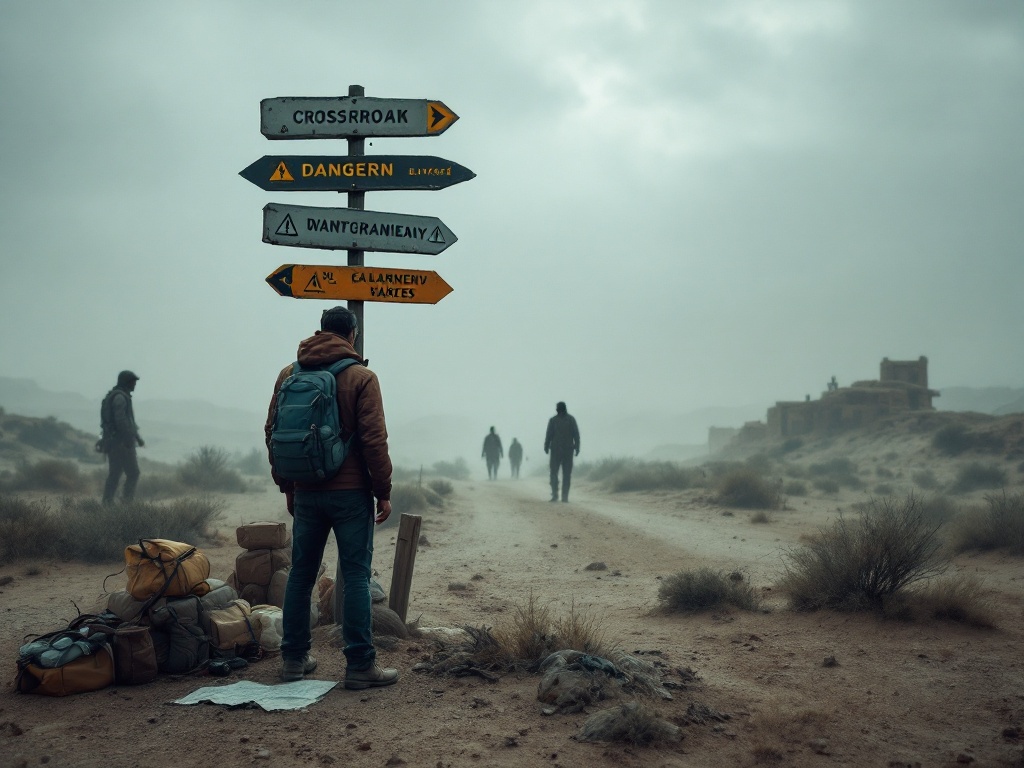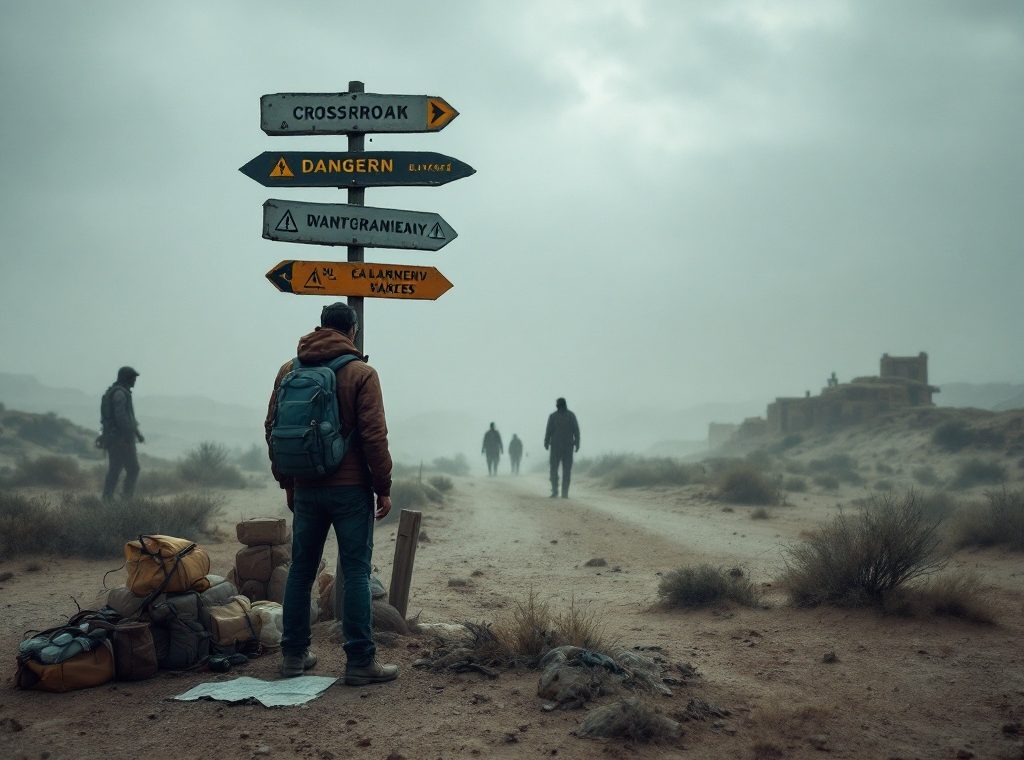Niger Safety Travel Tips: What You Need to Know Before You Go
Planning a trip to Niger? Reconsider. The U.S. government strongly advises against all travel to Niger due to extreme dangers. Terrorist groups like JNIM, ISIS, and Boko Haram pose significant kidnapping risks, especially for Westerners. Crime, civil unrest, and hazardous road conditions further complicate travel. If you’re already in Niger, consider leaving immediately. This article details crucial safety information, from health precautions and visa requirements to emergency preparedness, for those who must travel to or are currently in Niger. Learn how to mitigate risks and prioritize your safety in this volatile region.
Important information

- Niger is extremely dangerous right now, with threats of terrorism, kidnapping, and crime. The government strongly advises against all travel.
- Terrorist groups and crime pose significant risks. Kidnapping is a real threat, especially for Westerners. Exercise vigilance, especially in crowded areas.
- Medical facilities are limited. Obtain medical evacuation insurance and consult your doctor about recommended vaccinations and malaria prevention.
- Road travel is dangerous, especially at night, due to poor conditions and crime. Public transport is available but overcrowded and unregulated.
- Respect local customs and dress modestly. During Ramadan, avoid eating, drinking, or smoking publicly during daylight hours.
Travel Advisory and Safety Concerns in Niger
Niger is currently extremely dangerous, and the government strongly discourages all travel there. The country faces significant threats from political instability, terrorism, and kidnapping, creating a volatile security situation with limited consular support. If you’re currently in Niger, seriously consider departing while commercial flights are still an option.
Safety Concerns
Active terrorist groups like JNIM, ISIS, and Boko Haram pose a substantial risk, particularly the threat of kidnapping, especially for Westerners. Crime, including theft and robbery, is also prevalent, especially in the capital, Niamey. Exercise increased vigilance in crowded areas and heightened caution outside the capital.
Additional Risks
Protests and civil unrest can erupt unexpectedly and may turn violent. Travel during the rainy season is particularly hazardous due to the frequent occurrence of floods and landslides. Certain areas, especially those bordering Mali, Libya, Burkina Faso, and Lake Chad, are exceptionally dangerous due to a high incidence of violent crimes, including armed robbery. Even demonstrations that begin peacefully can escalate rapidly. Maintain constant awareness of your surroundings and stay updated on the latest developments.
What Safety Precautions Should Travelers Take?
Seek accommodation in hotels that employ armed Nigerien security personnel.
Avoid walking.
How to Prepare for Security Threats?
Develop a personal evacuation plan and do not rely on U.S. government assistance.
Avoid government buildings for your safety.
When traveling between the airport and Niamey, ensure you are in a convoy of at least two vehicles.
Maintain vigilance, particularly in crowded areas.
Stay aware of your surroundings.
Travel Planning and Documentation
Before traveling to Niger, confirm visa requirements with the nearest Nigerien embassy or consulate, as most nationalities need one. Ensure your passport’s validity extends at least six months beyond your intended stay. For emergency preparedness, inform someone of your travel plans and maintain regular contact. Photocopy essential documents like your passport and visa, keeping copies separate from originals. Locate and save contact details for your country’s embassy or consulate in Niger.
Visa and Passport
Most nationalities require a visa to enter Niger, so it’s crucial to confirm the specific requirements with your nearest Nigerien embassy or consulate. Ensure your passport remains valid for at least six months beyond your travel dates.
Safety and Emergency Preparedness
Inform someone about your itinerary and maintain regular contact throughout your trip. Photocopy important documents, such as your passport and visa, and store these copies separately from the originals. Locate your country’s embassy or consulate in Niger and keep their contact information readily available.
What Are the Entry Requirements and Visa Information?
Entering Niger requires a passport valid for at least six months beyond your departure date. You will also need a visa, regardless of your travel purpose (tourism, business, or studies). Secure your visa in advance. Families traveling with children should check for any additional requirements. For the most up-to-date information, consult the nearest Nigerien embassy or consulate.
What Emergency Plans Should You Have?
Develop a comprehensive emergency plan that includes self-reliance strategies for evacuation, independent of government assistance.
Boost your safety by enrolling in a traveler’s security program and confirm your emergency contacts are up-to-date.
Keep your travel documents readily available and stay informed about local news.
Familiarize yourself with important health information for travelers.
Consult a traveler’s checklist to ensure all safety precautions have been addressed.
Health and Medical Precautions
Traveling to Niger requires some health precautions. Consult your doctor about necessary vaccinations, including yellow fever and hepatitis A, as well as preventive medication for malaria due to the significant risk. Consider medical evacuation insurance for unforeseen circumstances.
What Vaccinations and Health Recommendations Are Necessary?
Stay up-to-date on routine vaccinations, especially Hepatitis A and Typhoid. For enhanced protection, consult your doctor about additional vaccines like Yellow Fever, Meningitis, and Polio.
Safe food and water practices are also essential. Stick to bottled water and avoid raw or undercooked foods. Frequent handwashing adds another layer of protection against illness.
Vaccinations
- Ensure routine vaccinations are up-to-date, including Hepatitis A and Typhoid.
- Consult your doctor about additional vaccines such as Yellow Fever, Meningitis, and Polio.
Food and Water Safety
- Drink bottled water.
- Avoid raw or undercooked foods.
- Practice frequent handwashing.
Should You Obtain Medical Evacuation Insurance?
Medical facilities in Niger are scarce, especially outside the capital, Niamey. Therefore, medical evacuation insurance is strongly recommended to ensure prompt care and transport if needed, given the limited resources in many local facilities. Obtain coverage before your trip; it’s crucial for your safety.
Crime and Civil Unrest
Be mindful of your surroundings to identify potential hazards.
Protect your belongings and avoid making yourself a target for theft.
Refrain from walking alone at night; there’s safety in numbers.
Keep expensive jewelry and electronics out of sight to deter unwanted attention.
Utilize hotel safes for securing important documents and valuables.
Steer clear of demonstrations and large gatherings, as these can become unpredictable and unsafe.
Research and avoid high-risk areas whenever possible.
Prioritize your safety by monitoring local news and staying informed about security situations to make well-informed decisions.
How to Stay Safe from Crime?
Enhance your safety by avoiding solitary walks, especially at night. Secure your valuables and maintain situational awareness.
Should You Avoid Demonstrations and High-Risk Areas?
Exercise increased caution in Niger due to the potential for civil unrest and crime. Avoid demonstrations and areas with heightened security risks.
Transport and Road Safety
Traveling by road in Niger can be risky due to poor road conditions and the threat of banditry and carjacking, especially at night. Avoid driving after dark. Public transport is available, but it is often overcrowded and unregulated. Consider these hazards when planning your trip.
What Are the Risks Associated with Road Travel?
Road travel in Niger presents safety challenges. Conditions, particularly outside urban areas, are frequently substandard. Be vigilant for reckless drivers, pedestrians, and animals, which are common road hazards. Night driving is especially risky due to the increased threat of carjackings and robberies. Maintain a high level of situational awareness and, whenever possible, travel with others in a convoy. Roadside assistance is not readily available. Should an accident occur, proceed to the nearest police station and file a report. Prioritize safety and remain alert while navigating Niger’s roads.
Be aware of substandard road conditions, especially outside urban areas. Road conditions in Niger, particularly outside urban areas, can be substandard.
Watch out for reckless drivers, pedestrians, and animals. These are common hazards on Niger’s roads.
Avoid driving at night if possible. Night driving is especially risky due to increased carjackings and robberies.
Maintain situational awareness and travel in a convoy when possible. Increased awareness of your surroundings and traveling with others can enhance safety.
Be prepared for limited roadside assistance. Roadside assistance is not readily available in Niger.
In case of an accident, report to the nearest police station. Filing a police report is essential after an accident.
How Safe Is Public Transportation in Niger?
Traveling by public transport in Niger can be hazardous due to overcrowding, poorly maintained vehicles, and limited infrastructure. Therefore, vigilance and awareness of your surroundings are essential for a safe journey. Here are some tips for navigating public transport in Niger:
Be aware of your belongings at all times. Petty theft can be common in crowded areas, so keep your valuables close and secure.
Travel during daylight hours whenever possible. Visibility is better, and there are generally more people around, which can deter potential problems.
Confirm the route and destination with the driver or conductor before boarding. This will help avoid unexpected detours or getting off at the wrong stop.
Avoid overly crowded vehicles. While it might mean waiting longer, it significantly reduces the risk of theft and discomfort.
Have small denominations of local currency readily available for fares. This will make transactions smoother and prevent potential disputes over change.
Cultural Sensitivity and Local Laws
Traveling in Niger requires respecting local customs and traditions, especially given its predominantly Muslim population. Dress modestly to avoid unwanted attention and foster respect. During Ramadan, publicly consuming food, drinks, or smoking during daylight hours is considered disrespectful. While same-sex sexual activity isn’t illegal, discretion is advised due to potential social stigma. Being mindful of these cultural norms ensures a safer and more respectful experience for everyone.
What Cultural Norms and Dress Codes Should You Follow?
Traveling to Niger requires awareness of local customs, especially regarding dress code and religious practices. Modest attire is essential, particularly during Ramadan, as it demonstrates respect and helps you blend in. Avoid public displays of eating, drinking, or smoking during daylight hours in Ramadan. While same-sex relationships are not illegal, discretion is advised due to societal norms. Respecting these customs will enhance your travel experience and ensure a safe and respectful visit.
Dress Code
Modest clothing is vital in Niger’s predominantly Muslim society, especially during Ramadan. This shows cultural sensitivity and helps avoid unwanted attention.
Ramadan Observance
Refrain from eating, drinking, and smoking publicly during daylight hours in Ramadan. This demonstrates respect for local beliefs.
Relationships
While same-sex relationships aren’t illegal, discretion is recommended due to societal norms.
Respectful Interactions
Respecting local customs enhances your travel experience and ensures a safe and respectful visit.
Natural Disasters and Weather Conditions
Niger experiences three distinct seasons. The rainy season, spanning from June to October, is characterized by heavy downpours, frequently leading to floods and landslides. Travelers are advised to exercise caution during this period.
Stay informed. Monitor weather forecasts and heed local authorities’ instructions.
Keep emergency contacts readily accessible.
Pack essential supplies. Include a first-aid kit and extra food.
Be prepared for potential travel delays or disruptions.
How to Prepare for Extreme Weather and Natural Disasters?
Traveling to Niger, especially during the rainy season (June to October), requires staying updated on weather forecasts. Heavy downpours can lead to floods and landslides, so pack appropriate clothing and emergency supplies. Planning ahead is crucial. Establish a communication strategy with family or friends. Identify safe havens in case evacuation becomes necessary. Research potential natural disasters specific to your destination. A well-prepared trip ensures safety and enjoyment.
Check the weather forecast regularly, especially during the rainy season (June to October). This will help you stay informed about potential hazards like heavy downpours, floods, and landslides.
Pack accordingly. Bring suitable clothing for wet conditions and essential emergency supplies like a first-aid kit, flashlight, and extra batteries.
Establish a communication strategy. Inform family or friends about your travel plans and agree on a method for staying in touch during emergencies.
Identify safe havens. Research potential evacuation points or shelters in your destination area in case of severe weather events.
Research region-specific hazards. Learn about potential natural disasters common in your destination during the rainy season and take necessary precautions.
Additional Travel Tips
Planning a trip abroad? Enroll in the Smart Traveler Enrollment Program (STEP) to enhance your safety and stay informed. STEP is a free service that allows U.S. citizens and nationals to register their trip with the nearest U.S. Embassy or Consulate. By enrolling, you’ll receive important information from the Embassy about safety conditions in your destination country, helping you make informed decisions about your travel plans. In case of an emergency, STEP also makes it easier for the U.S. Embassy or Consulate to contact you or your family.
Should You Enroll in the Smart Traveler Enrollment Program (STEP)?
Planning a trip abroad? Consider enrolling in the Smart Traveler Enrollment Program (STEP). STEP is a free service that allows U.S. citizens and nationals to register their trip with the nearest U.S. Embassy or Consulate. By enrolling, you gain access to important safety updates and can receive assistance in emergencies, such as natural disasters, civil unrest, or family crises.


















